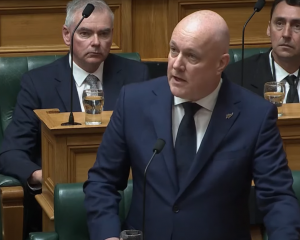
Yaqubi, 21, was murdered in December last year by Kanwarpal Singh, who last month was sentenced to 17 years in prison after pleading guilty to murder.
The Herald on Sunday earlier revealed that she had gone to police with concerns she was being harassed two months before she was murdered.
Following the revelations, Police Minister Ginny Andersen said she would be taking a “close look” at the findings of an independent investigation into Farzana Yaqubi’s murder to ensure there are “appropriate and prompt” processes in place for police to respond to complaints of stalking and harassment.
It’s understood Labour is set to announce today it is considering criminalising stalking.
It comes after advocates told the Herald Yaqubi’s death could have been prevented if such a law existed.
Farzana Yaqubi was killed in Massey last year.
Singh was working as a security guard on Queen St and Yaqubi was at AUT when they met, court documents say.
She was passing by his workplace and he struck up a conversation with her and invited her for a coffee.
He began to continuously message her on Instagram. She blocked him, but the messages continued over the next two years, as he created various new social media accounts to contact her. He then started sending her threats, including kidnapping her.
“If u don’t wanna say anything I will kidnap u n give u 365 days to fall in love with me,” he said.
Singh added her family and friends as he continually tried to contact her via social media.
Yaqubi made an online report to police on October 25 last year complaining about Singh’s harassing behaviour. It didn’t stop.
On December 5, she noticed him following her at a shopping mall and contacted a security guard for help.
The following day he sent her a video taken outside her home.

Yaqubi made a statement about Singh’s stalking behaviour and gave officers screenshots of Singh’s messages.
The next day Singh had a pizza delivered to her home in Massey.
Two weeks later, on December 18, Yaqubi finished work at the Westgate Mall and caught the bus to Royal Heights.
She got off the bus and walked to an alleyway near the Waitakere Badminton Centre on her way to the home she shared with her family in Cedar Heights Ave.
Singh was waiting in the carpark of the centre in his Toyota.
When he saw her walking in the alleyway, he approached her wielding a large knife.
When Yaqubi saw Singh, she tried to call police.
He stabbed her several times in the stomach and chest.
As she fell to the ground screaming, Singh continued stabbing as he stood over her.
When members of the public approached, he retreated down the alley, jumped a fence and fled in his car.
Yaqubi died at the scene. She had suffered 12 stab wounds along with defensive injuries.
Singh was arrested at home the next day. He had not previously appeared before the court.
‘Widespread concerns’
National’s Justice spokesman Paul Goldsmith earlier told the Herald Yaqubi’s death was a “senseless killing”.
In relation to the criminalisation of stalking, Goldsmith said the party shared “widespread concerns”, that current laws relating to stalking “may not be sufficiently robust and effective”.
“National will have more to say on justice policies over the next couple of months.”
Andersen, in her role as Justice Minister earlier told the Herald stalking was “extremely serious behaviour”.
“It is a complex area of the law and it’s incredibly important any reform is fit for purpose.”
Late last year, Ministry of Justice officials consulted with academics, specialist-service providers, and victim advocates on several issues related to family violence and sexual violence, including stalking and harassment, Andersen said.
“As a result, phase one of a three-year work programme to improve outcomes for victims has progressed, with a bill being introduced shortly on the relevance of consent for child victims and barriers to lifting automatic name suppression.
“The work relating to stalking and harassment required further review and consideration. Later this year I am expecting advice on the next possible phase of policy work on family violence and sexual violence, which I anticipate will include stalking and harassment.”
The Coalition for the Safety of Women and Children co-ordinator, Leonie Morris, earlier told the Herald the coalition believed Yaqubi’s death could have been prevented if New Zealand had criminalised stalking.
“Currently various types of stalking and harassment are referred to in different pieces of legislation [primarily the Harassment Act and the Harmful Digital Communications Act] but this leaves many victim/survivors unprotected,” Morris said.
“Stalking is unwanted, repetitive and persistent intrusions into a person’s life. It is usually designed to control the victim, and it can be terrifying. It is a known risk factor/precursor for severe and sometimes fatal violence.”
Morris said New Zealand’s “outdated and piecemeal legislation” meant that stalking was not illegal in New Zealand. It is illegal in Australia, the United Kingdom and the USA, she said.
“The Government needs to make stalking illegal by adding it to the Crimes Act. This would keep everybody safer, particularly women.”
She said currently police “lack the tools” they need to protect victims from stalking.
Morris said adding stalking to the Crimes Act would ensure police were trained about stalking and its harms, raise public awareness, and allow data about stalking to be collected.
Clinical psychologist Dr Alison Towns also said this was just the type of case that a criminal stalking law, alongside full education and training of the police, would have potentially prevented.
Towns, who is a gender-based violence specialist, said stalking was associated with homicide
and it should be considered to be an extremely serious offence.
“Police in the UK who have ignored stalking behaviour, despite complaints from the victim, and when the victim has subsequently been killed, have been charged with negligence and sacked. The same should be happening here.”
She told the Herald most other countries in the developed world have a criminal stalking law, and while a person can be charged with criminal harassment under the New Zealand Harassment Act, this rarely occurs.
“The most at-risk women are those women who are stalked by ex-partners or by those who consider themselves entitled to have a relationship with that woman when she is not, or is no longer, interested. When the police act on stalking, they can potentially prevent a homicide.”
What might appear to some to be trivial intrusions into the women’s life, if persistent, unwanted and unrelenting, can be extremely dangerous, she said.
“Victims of stalking are often good predictors of their own safety, and there may be [many] more incidents of the stalking than she reports. Stalking causes extreme harm to victims, who commonly feel that they cannot go about their daily lives safely.”
Over time, she said their sleep, mental health, ability to work and attend education becomes eroded.
“If the woman has children, her children are also affected. Victims and their children commonly do not feel safe in their own homes.”
Towns said New Zealand needs a criminal stalking law and the police and judiciary need to be educated with regard to stalking.
“Politicians need to know that while they dither, we will continue to see more deaths of women through homicide following stalking.”
The Herald on Sunday earlier revealed the Independent Police Conduct Authority (IPCA) was investigating whether there could have been improvements in the police response.
Acting Detective Inspector Tim Williams earlier told the Herald on Sunday that in the early stages of the investigation, staff became aware of recent contact Yaqubi had with police.
In late October 2022, Yaqubi filed an online report with police about “harassing behaviour”, Williams said.
“Farzana was advised to attend a police station to provide further information so the matter could be considered for further action, which was carried out in early December 2022.
“Police were progressing this matter further when Farzana was senselessly murdered.”
Police referred the matter to the Independent Police Conduct Authority (IPCA) to explore
“whether there could have been improvements in the police response”, Williams said.
“Police will await the findings of this independent review so that any findings can be considered further.
“While nothing can bring her back, the guilty plea, in this case, will spare the family this matter going to a jury trial,” Williams said.
“Police continue to support Farzana’s family as they move forward with their lives.”












